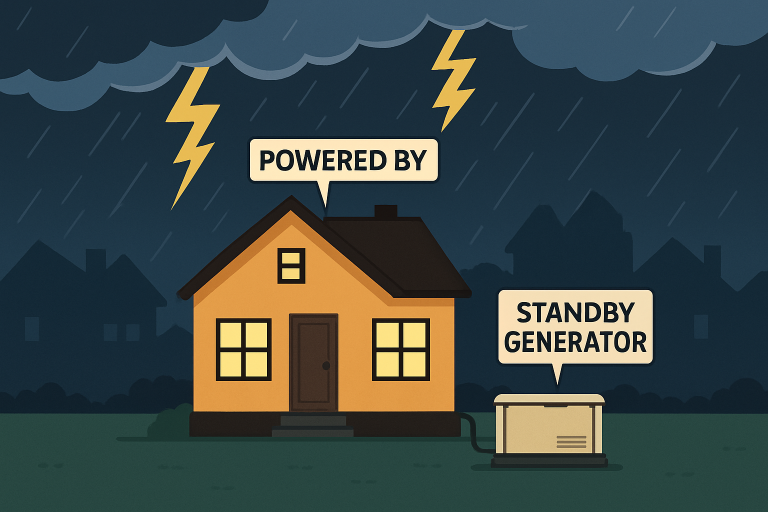Table of Contents
Why Backup Power Matters in Today’s Homes
Power outages have become a reality for millions of Americans as severe storms, grid failures, and aging infrastructure frequently interrupt the flow of electricity. Over the past decade, weather-related outages have soared by more than 60% across the United States, leaving families without light, refrigeration, communication, or climate control. Back-up power systems have shifted from luxury amenities to essential home features in this climate.
The stakes are even higher for those in the Gulf Coast or hurricane-prone areas. Homeowners searching for the ultimate peace of mind turn to Generac Generators Panama City FL, a trusted solution to protect their property and family during unexpected blackouts. Being prepared means keeping daily life stable and ensuring that life’s essentials—like refrigeration, medical devices, and security systems—run uninterrupted.
How Standby Generators Keep Life Moving
Standby generators are designed to keep households running smoothly during outages. Unlike portable models, these systems connect directly to a home’s electrical infrastructure and detect when utility service is lost. They automatically switch on within seconds, delivering power to critical circuits and restoring normalcy with minimal disruption. This seamless operation is particularly important for those working from home, caring for vulnerable family members, or needing uninterrupted access to climate control and internet service.
The reliability offered by a standby generator cannot be overstated—especially for homes in remote or disaster-prone regions. A robust backup plan ensures that severe weather or utility grid failures cause inconvenience, not crisis.
Selecting an effective backup power solution begins with clearly understanding your household’s electrical demands. Prioritize the devices you need during an outage: heating and cooling systems, refrigerators, lighting, and essential medical equipment. Add up the total wattage required by these appliances for an accurate estimate. Many generator manufacturers provide handy online calculators, and resources like energy.gov offer thorough guides to help homeowners estimate power requirements and prepare for outages.

Types of Home Generators: Pros and Cons
Home generators generally fall into two categories: portable and standby. Each type has its strengths and limitations:
Portable Generators
- Pros: Cost-effective, movable between locations, and appropriate for powering a few essential appliances.
- The cons are that it requires manual setup, produces noise, and must be refueled regularly. Proper safety precautions are essential, as improper use can cause carbon monoxide poisoning.
Standby Generators
- Pros: Automatic operation, ability to power larger loads, and direct connection to home fuel sources like natural gas or propane. They start automatically and can keep the home running smoothly during extended outages.
- The cons are higher upfront installation costs and the need for professional setup. Regular maintenance is also necessary to ensure reliability.
Solar-Powered Backup Systems
- Eco-friendly and silent, relying on sunlight and battery banks. However, their dependability during prolonged storms or at night is limited without substantial battery storage.
Installation Basics: Dos and Don’ts
- Consult a licensed electrician—professional installation ensures that electrical codes are met and guarantees operational safety.
- Don’t run portable generators inside garages or basements. Always position them outside and away from windows, doors, or vents to avoid carbon monoxide hazards.
- Maintain proper clearance for safe ventilation and securely connect your generator using a transfer switch to prevent power from back-feeding onto utility lines.
- Conduct a test run under load conditions to ensure the setup works when needed most.
Proper installation is about protecting your investment and safeguarding your household, both physically and financially.
Maintenance Tips for Reliable Performance
Consistent maintenance keeps your generator reliable for years. Check oil and coolant levels, replace air and fuel filters per manufacturer recommendations, and “exercise” the generator every few weeks to keep internal components lubricated. Schedule biannual professional inspections to catch potential issues before they become costly repairs. Store fuel safely, and use fuel stabilizers if your generator will sit unused for extended periods.
Neglecting maintenance can lead to costly breakdowns or leave you unprotected during a critical outage. Keep a maintenance log to track service intervals and performance notes for additional peace of mind.
Staying Safe and Informed During Outages
The risk of carbon monoxide poisoning, fire hazards, and electrical shock is real during a blackout, especially if makeshift solutions are attempted. Install battery-operated carbon monoxide detectors and always follow manufacturer instructions—stock emergency supplies such as flashlights, batteries, bottled water, and non-perishable foods. For up-to-the-minute outage details, emergency instructions, and local resource updates, check Ready.gov. Having reliable information ensures informed decisions during extended power failures.
Preparing for the Next Outage: Steps You Can Take
- Review your emergency plan at least yearly, updating it as household needs or equipment change.
- Keep essential emergency contacts—including utility services and repair professionals—posted near your generator control panel for quick access.
- Audit your homeowner’s insurance annually to confirm that outage-related losses are covered under your current policy.
- Stay proactive: weather-proof your home, make preparedness an ongoing household conversation, and regularly review your backup power strategy as weather patterns and technology evolve.
Reliable home power isn’t just an upgrade—it’s a foundational part of modern security and comfort. By investing in the right backup power solution and preparing your household, you can face the next outage confidently, knowing you’re protected and empowered.
